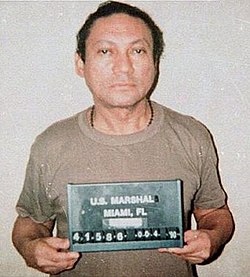Manuel Noriega
| Oh no, they're talking about Politics |
| Theory |
| Practice |
| Philosophies |
| Terms |
| As usual |
| Country sections |
|
|
Manuel Antonio Noriega Moreno (a.k.a. Pineapple Face) (1934–2017) was a former colonel, later self-proclaimed general, in the Panamanian Defense Forces. He was the de facto military dictator of Panama from 1983 to 1989 although for almost all of that period Panama was supposedly a democracy; the Presidents during that period were a series of Noriega puppets elected in rigged elections.[1] Noriega took power following the death of Omar Torrijos, also a military dictator albeit a popular one due to his left-populist policies. A two-year power struggle followed Torrijos' death during which two other military dictators briefly assumed control, with Noriega emerging on top in 1983.
Noriega was on the CIA payroll as early as 1967.[2] During Torrijos' reign and most of his, he cooperated with the U.S. government in its foreign policy objectives in Central America, including allowing Panama to be used as a conduit for support for the rightist Contra guerrilla insurgency in Nicaragua. Noriega also had ties to the drug trade in Panama although the actual extent of this (as opposed to how much of it was propaganda intended to drum up support for the 1989 U.S. invasion) is unclear. During the 1980s, the Ronald Reagan administration's ties to Noriega became an issue in U.S. politics with John Kerry and Jesse Helms being especially vocal critics of U.S. involvement with him, although from opposing sides of the political spectrum: Kerry out of opposition to U.S. policies in Central America and Helms out of continued opposition to the 1979 Panama Canal Treaties, which he wanted to see repealed. Nonetheless, Noriega remained a close U.S. ally during the Reagan administration until he began a series of policies in response to the increased criticism from within the U.S., such as freezing U.S. bank accounts in Panamanian banks and harassment of U.S. military personnel and civilians in Panama by the Panamanian Defense Forces.
Eventually around the spring of 1989 the George H.W. Bush administration decided Noriega had become an "embarrassment," and took steps to curtail U.S. cooperation with the Panamanian government and impose economic sanctions, culminating in heavy U.S. involvement in support of the slate of opposition candidates in the May 1989 elections.[3] According to all objective outside observers, the opposition slate won the election; Noriega responded by nullifying the election results. In December 1989, Noriega gave a speech declaring himself the "Maximum Leader" of Panama, making official what he had already been since 1983, and declaring that a state of war existed between Panama and the United States. Near the end of December the U.S. invaded Panama, installed the opposition slate from the May elections, and captured Manuel Noriega for trial in Miami, Florida on drug trafficking charges. The official impetus for the invasion was an incident three days before the invasion in which off-duty U.S. military personnel were fired upon by Panamanian Defense Forces; however the invasion had been planned months in advance.
He spent 20 years in prison in the U.S. and was then extradited to France to face prison time there, being convicted in absentia on a host of charges.[4]. In 2011 he was further extradited to Panama where he remained incarcerated at El Renacer prison[5] until his death in May 2017 due to complications caused by surgery to remove a benign brain tumor. Prior to his death, Noriega filed an unsuccessful lawsuit against the game publisher Activision for depicting him and using his name without his permission in the video game Call of Duty: Black Ops II, and portraying as "a kidnapper, murderer and enemy of the state".[6]
In short, Noriega serves as a cautionary tale to all geopolitical powers of the risks inherent in keeping pet dictators. Sooner or later they tend to go feral, with messy results for everyone involved.
References[edit]
- ↑ Biography of Manuel Noriega
- ↑ Time Magazine: Who's Who on the CIA Payroll
- ↑ Manuel Noriega — From US friend to foe
- ↑ Reuters: Manuel Noriega sentenced to 7 years in France
- ↑ French court clears Panama's Noriega for extradition
- ↑ Gibbons-Neff, Thomas (July 16, 2014). "Former dictator Manuel Noriega suing 'Call of Duty' makers". The Washington Post. Retrieved July 18, 2014.

